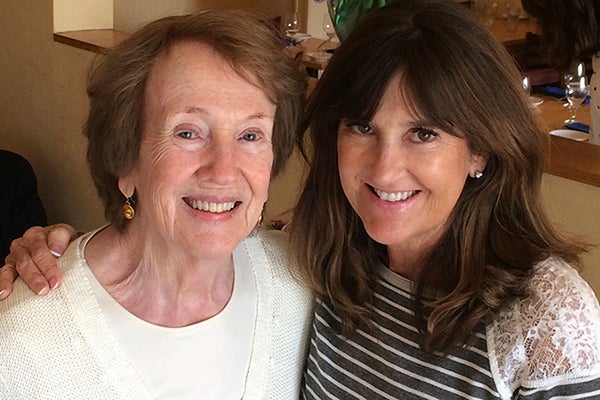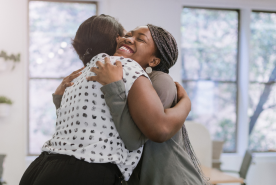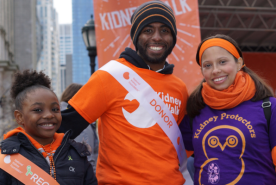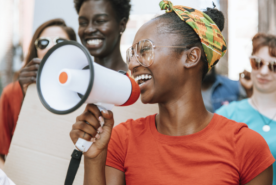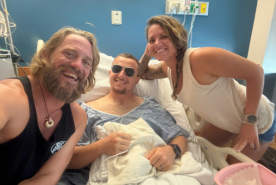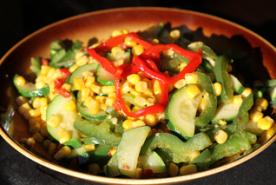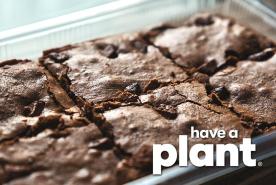Health systems, social systems, and environmental factors Organ and tissue transplantation and donation Healthcare system navigation and patient advocacy Kidney transplantation Patient advocacy
October 05, 2017
<div>
<div>My mom sat down next to me at her kitchen table. “I want to do this,” she said.</div>
<div> </div>
<div>“Holy sh*t, Mom.” I thought of the thousands of conversations we’d had at this table, but never one quite like this.</div>
</div>
by Jennifer Cramer-Miller, kidney patient
My mom sat down next to me at her kitchen table. “I want to do this,” she said.
“Holy sh*t, Mom.” I thought of the thousands of conversations we’d had at this table, but never one quite like this.
“That’s not the reaction I was expecting,” she said smiling. “But okay, holy sh*t works.” Although the moment was serious, we both started to laugh.
Since I was 22 years old, my mom had navigated my stubborn kidney illness with me. Doctors, pokes, medications, and transplants. Through it all, she had been my steadfast advocate—a term we affectionately changed to “Avocado.”
She acted as if every ho-hum appointment was a desirable social invitation, and referred to them as riots. For example, I’d say: “Nephrology appointment tomorrow, want to come?” followed by her enthusiastic, “Love to—what a riot!”
Now, I took a big sip of caffeine to boost my low energy. My previous two kidney transplants had lasted seven years each, but the latest one was failing, and I needed another. We had just learned that recent changes in matching criteria allowed my mom to be my donor. But…What if it doesn’t work? What if there are complications? What if something horrible happens? My thoughts scattered like confetti.
I remembered when I first got sick, just after college, and moved back to my parents’ home. My weakened immune system welcomed opportunistic infections and fevers, so my mom set up pots and pans on the floor by my bed. It was her unconventional version of a hospital call light. When I woke up shivering and throwing up in the middle of the night, I clanked the lids. She ran down the hall (like a highly charged Shirley MacLaine in Terms of Endearment) and threw her body over mine.
“You need a blanket of love,” she said as if that were a standard nurse procedure.
Under the pressure, I eked out a, “Thanks, Mom.”
“Everyone needs an Avocado,” she would reply as she squished me with her warm body.
I felt that exact same warmth now. But it was tinged with fear, for her.
“I’m going to do it,” she said looking at me from across the table. “I want to give you my kidney.” Then she smiled. “Come on. A couple of surgeries? It’ll be a riot.”
I smiled too, but I felt tears well up in my eyes.
When I was a little girl, my mom sat with me in this same spot and nursed my don’t-feel-goods with cinnamon toast and 7-Up. There was a healing power in her buttered bread, sprinkled with the perfect ratio of sugar and spice. She transferred her love through that toast, and it always made me feel better.
I was not a little girl anymore, but she was still sitting by my side and trying to make everything okay. I set down my mug, “Mom….”
She interrupted, “One question, would you do this for Liza?” She knew I would do anything for my five-year-old Liza, the miraculous daughter I wasn’t sure I would ever be able to have. Mom must have seen a flash in my eyes because she looked satisfied—as if she had clarified something essential that she wanted me to realize—you are my daughter.
I finally agreed. The night before the surgeries, we compared the effects from the jug of laxative prep water we each had to drink to power wash our insides. The next day, we arrived at the hospital and gave each other extra long hugs. I couldn’t believe this was happening. She was going into surgery to give me her kidney. This was a long way from sitting at the table with cinnamon toast and 7-Up.
Hours later, we awoke in separate recovery rooms with incision pain that pierced through anesthesia’s fog. The first question I asked was, “Is my mom okay?”
“She’s doing well,” the nurse told me. “She’s asking about you too. You both did great.” Relieved, I faded back into a sleepy haze.
Later, my husband and daughter wheeled me to her room. She looked tired and war weary. Her morphine-dosed words slurred together. Antiseptic fumes wafted up from the vinyl floor. She tried to form her winning smile, but painkillers blunted the effort. Within her small frame in that hospital bed, I saw a giant of grace and goodness.
I wanted to throw myself on top of her and be her blanket of love, though it would be too painful for us both. Instead, I asked the nurse to look into reducing my mom’s morphine dosage to help with the slurring. At that moment, I was certain about two things—I would never be able to repay her for all her gifts, and we would always take care of each other.
Her eyes were damp. “Thanks for asking about that,” she muttered softly, her lips curling into a gentle smile.
“Everyone needs an Avocado, Mom,” I said and squeezed her hand.
